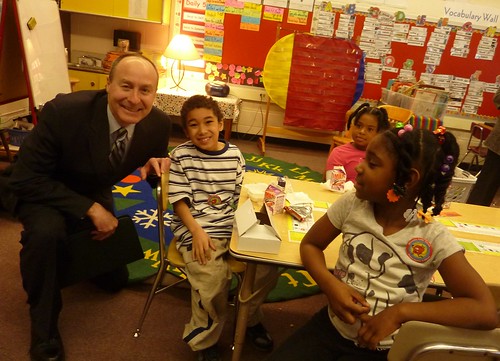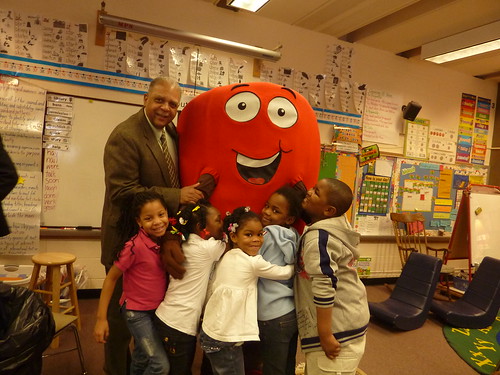There is much we adults can learn from children, and one of them is being able to appreciate the simple things. I was at the Milwaukee Sign Language School in Milwaukee for a celebration of School Breakfast Week. I was thrilled by the students’ delight as Active Apple (Milwaukee Public Schools’ nutrition and fitness mascot) and Power Panther (USDA’s nutrition and fitness mascot) strolled into their classrooms.
The hearing-impaired students watched with rapt attention as their teachers signed to them about the mascots and special guests. All the children seemed thrilled with the Active Apple pins and bookmarks the special guests distributed to them. Best of all, they clearly liked the calming routine of picking up their breakfast bags and eating at their desks. The cold breakfast, served in a simple paper box, was simple yet satisfying, as evidenced by the disappearing Multi-grain Cheerios, milk, juice and cereal bars.

I asked one little boy what was his favorite thing about eating breakfast at school. I expected him to name a favorite cereal or maybe the breakfast waffle. But he said simply, “It helps me focus on school.” That statement really hit home for me, and I think it speaks volumes about the importance of the School Breakfast Program.
Eating a nutritious breakfast gives students the nutrients and energy they need to concentrate on school, learn better, grow healthier, and become productive citizens. Milwaukee Public Schools (MPS) Superintendent Gregory Thornton summed it all up as we walked through the hallway: “We love the School Breakfast Program in Milwaukee. It’s great for the kids.”
At USDA, we know that implementing a Breakfast in the Classroom program takes a lot of hard work, persuasion and resources from many partners. In Milwaukee, the expansion of school breakfast has indeed been a successful partnership. The statistics speak for themselves: 87 MPS schools out of 184 now serve breakfast in the classroom and school breakfast participation has increased 55% in the last two years. These are schools where 95% or more of the enrolled students are eligible for free and reduced price school meals.
I was able to thank some of those hard-working partners at the event for their tireless efforts to expand the School Breakfast Program in Milwaukee and throughout Wisconsin. Without them, this would not be possible. Thanks to USDA’s School Breakfast Program and a host of partners, schoolchildren in Milwaukee will be better prepared to win the future.

